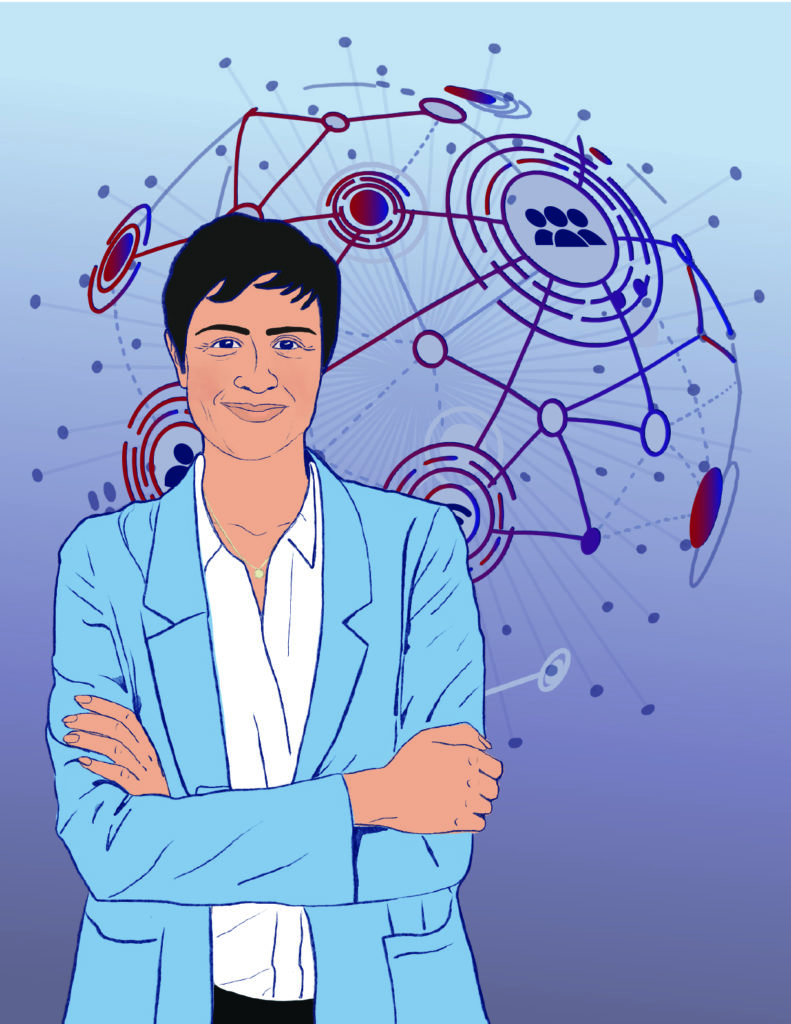
Humans have never been more connected to one another, though the speed with which we can share with one another has its drawbacks. For example, the spread of COVID-19, as well as misinformation about it, have both been facilitated by our highly connected online and in-person networks. Fortunately, the branches of mathematics known as information theory and network theory can help us to understand how both systems work and how to control them.
NSF CAREER Award recipient Shirin Saeedi Bidokhti, Assistant Professor in Electrical and Systems Engineering, will use the grant to conduct research on both online social networks and COVID-19 contact tracing networks. As case studies, these real-word examples will inform networked systems’ theoretical foundations, as well as the design of learning and decision-making algorithms that help us to make sense of them. She will also use the funding to develop a new course module that brings information and network theory into practice for undergraduate students at Penn.
Using a combination of tools from information theory, network theory and machine learning, Saeedi Bidokhti aims to narrow the gap between theory and practice through algorithm-informed real-time data sampling, estimation and inference in networked systems. Her work aims to produce smarter algorithms that can extract information, infer about these systems, and ultimately provide more precise control of them.
While such algorithms are already improving our ability to understand complex networks, there is always a tradeoff that needs to be considered when it comes time to use that information.
“In information extraction, knowing when to sample with real-time data makes a difference, says Saeedi Bidokhti. “It helps us to know if we should act now or wait to sample, facing the tradeoff of gathering the most information while minimizing costs to most efficiently control the system.”
The first step to understanding any problem within a system is to look at its real-world limits due to physics or biology. Then, a theoretical algorithm can be applied to the problem that is as close to the optimal solution as possible.
“In the case of controlling COVID-19, the optimal solution is to test everyone,” says Saeedi Bidokhti. “However, that is not practical, so you then scale back and find the practical solution. Algorithms play a part in this scaling-back process to ensure we are designing a testing strategy that provides the most efficient understanding and control of the disease. Testing the potential positive people to control the spread is important, but we should also frequently test people who act as hubs in community networks, to prevent disproportionately high spread, and algorithms can help us identify those people.”
Saeedi Bidokhti’s work on COVID-19 contact tracing is already underway with both real data and simulations. She hopes that the work in these kinds of networks will allow us to “learn from the pandemic to strategize for the future.”
Focusing on a different kind of spread, Saeedi Bidokhti acknowledges that while both online and in-person networks can be understood based on the same framework, the spread of misinformation and the spread of COVID-19 involve inherently different factors of psychology and biology in the type of information being spread.
“The design for each of these networks will be different. The spread of misinformation does not just depend on who you come into contact with, it also depends on your perception and interpretation of the information being shared,” say Saeedi Bidokhti. “However, with our multidisciplinary approach, we are hoping to help design future policies for social networks based on more than just the fundamentals.”
To bring her research to the public, Saeedi Bidokhti has planned to partner with a few different programs, including the NSF Innovation Corps to collaborate with industry, and NSF’s Upward Bound Math and Science Program for high schoolers.
“A major focus of the CAREER Award is outreach, and I am hoping to bring this work to a few different audiences,” says Saeedi Bidokhti. “Specifically, within the University, I am planning to work with the Center for Undergraduate Research and Fellowships to use this research project as a platform for more inclusive mentorship. I see that this is an opportunity to bring young, underrepresented scientists into research and increase their confidence in the field in general, and with that, they can be successful anywhere.”
